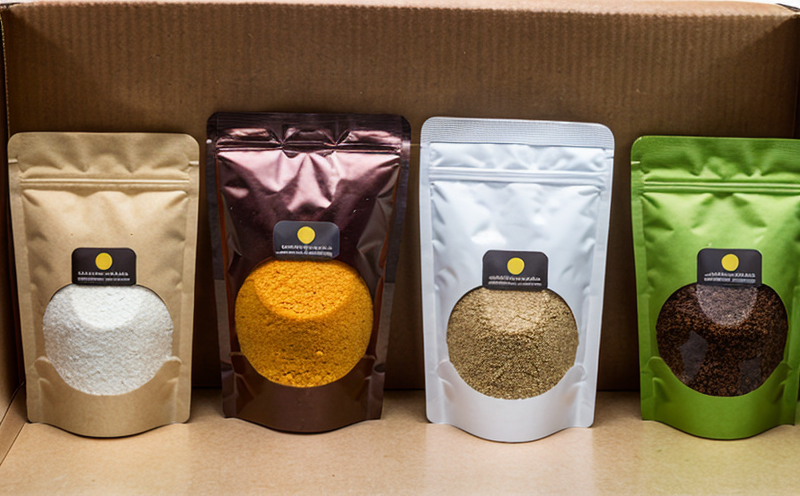Comprehensive Food Contact Materials and Packaging Safety Testing
Ensuring that food contact materials (FCMs) and packaging meet stringent safety standards is essential to protect consumer health and comply with regulatory requirements. This service offers a comprehensive approach, covering all aspects of FCMs and packaging testing to ensure they are safe for use in the food industry.
The testing process starts with the identification of potential contaminants that could leach into food products during storage or preparation. Common materials tested include plastics, metals, paper, cardboard, coatings, and adhesives used in packaging. Compliance with international standards such as FDA (Food and Drug Administration), EU Regulation 10/2011, and EN 1058-3 is crucial for the safety and acceptability of FCMs.
Our testing begins with a detailed review of the raw materials used in manufacturing. This includes examining the chemical composition, identifying potential migration risks, and assessing compatibility with food substances. Specimen preparation involves creating realistic scenarios that replicate how these materials might interact with different types of food under various conditions. For instance, we consider temperature variations, storage durations, and exposure to specific chemicals.
Instrumentation plays a critical role in this testing process, using advanced analytical techniques such as High-Performance Liquid Chromatography (HPLC), Gas Chromatography-Mass Spectrometry (GC-MS), and Fourier Transform Infrared Spectroscopy (FTIR). These tools allow us to detect trace amounts of contaminants that could pose risks if they migrate into food products. Acceptance criteria are strictly adhered to, ensuring that any levels exceeding permissible limits must be addressed before the FCM or packaging can be deemed safe for use.
The testing process also includes evaluating the physical properties of the materials, such as barrier properties and mechanical strength, which are vital for maintaining food quality and safety. This ensures that the packaging can effectively protect the integrity of the food product throughout its shelf life. Compliance with international standards is not only essential but also a legal requirement in many countries, making it imperative to stay updated on current regulations.
Our team of experts works closely with clients from various sectors including consumer goods manufacturers, food processors, and packaging suppliers. By leveraging our extensive experience and cutting-edge facilities, we provide tailored solutions that meet the unique needs of each client. From initial consultation through final report delivery, our goal is to ensure that every aspect of FCM and packaging safety is thoroughly examined and documented.
Why It Matters
The importance of food contact materials cannot be overstated in maintaining public health. Unsafe FCMs or packaging can lead to the contamination of food products, causing serious health issues for consumers. Regulatory bodies worldwide have implemented strict guidelines and standards to prevent such incidents. Ensuring compliance with these regulations is not just a matter of avoiding legal penalties but also protecting brand reputation.
Consumer trust in brands that prioritize safety will only grow stronger as awareness about the risks associated with unsafe FCMs increases. By investing in comprehensive testing services, companies can demonstrate their commitment to quality and integrity, thereby fostering long-term relationships with customers. Moreover, compliance helps mitigate potential recalls or lawsuits that could result from contaminated products.
From a business perspective, ensuring food safety also translates into cost savings by reducing the likelihood of costly product withdrawals and replacements. It reduces the risk of negative publicity which can significantly impact sales and brand value. For R&D teams, thorough testing allows for continuous improvement in product design and formulation, leading to innovative solutions that meet both regulatory requirements and consumer expectations.
Benefits
The benefits of comprehensive FCM and packaging safety testing extend beyond mere compliance; they contribute significantly to overall business success. By conducting thorough tests at every stage, businesses can ensure their products are safe for consumption while also enhancing brand reputation.
Achieving regulatory compliance is just the first step; obtaining certification from recognized bodies like NSF International or FDA can set a company apart in competitive markets. This certification demonstrates a commitment to excellence and builds consumer confidence, potentially leading to increased market share and customer loyalty. Beyond immediate business advantages, investing in such testing fosters innovation within R&D teams who continuously strive for safer and more effective solutions.
For procurement departments, working with suppliers who have undergone rigorous testing ensures that only high-quality materials are used in production processes. This reduces the risk of substandard components being incorporated into final products, thereby maintaining consistent quality standards across all batches produced by different manufacturers.
Customer Impact and Satisfaction
When customers know their food is safe and free from harmful contaminants, they are more likely to trust the brands producing it. This increased confidence translates directly into higher levels of customer satisfaction and loyalty. Companies that invest in thorough FCM testing not only avoid reputational damage but also enhance their standing among consumers.
Compliance with regulations is crucial for maintaining consumer trust; non-compliance can result in severe consequences, including product recalls and legal action. By prioritizing safety through rigorous testing protocols, businesses can protect themselves against these risks while simultaneously promoting responsible practices within the industry.
R&D teams benefit from this focus on safety as well. The insights gained from comprehensive tests inform new product developments aimed at meeting ever-evolving standards set by regulatory authorities. This proactive approach ensures that innovations are not only legally sound but also aligned with consumer needs and preferences.





